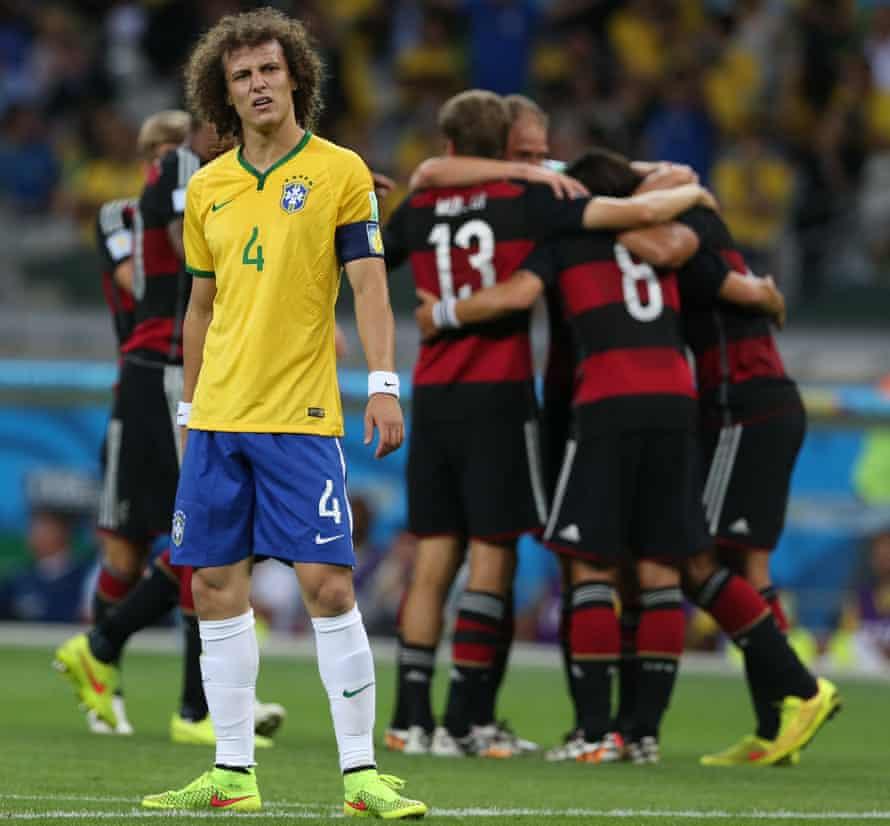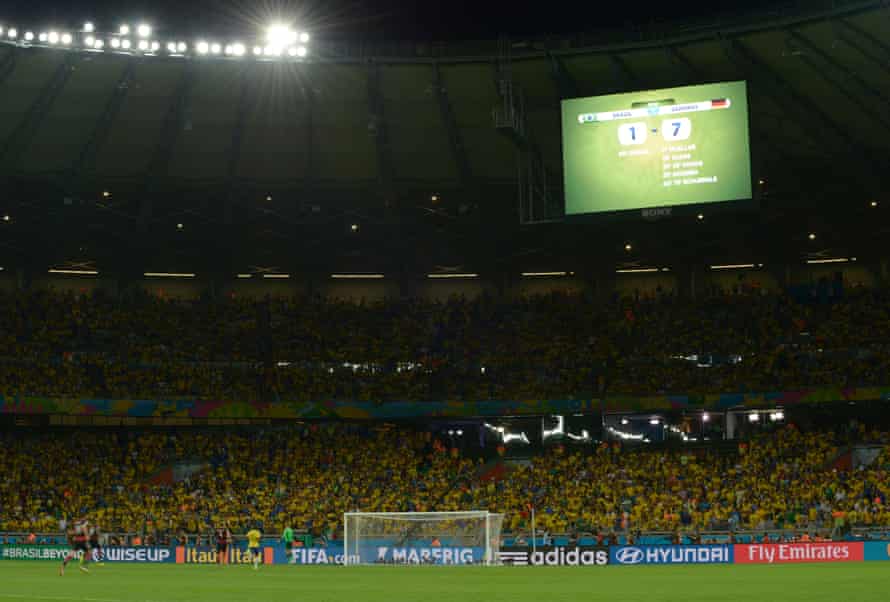Funny Germany and Brazil Soccer 2018
W hen it comes to the World Cup, hosting is supposed to help. Just ask Uruguay (1930), Italy (1934), England (1966), West Germany (1974), Argentina (1978) and France (1998), or Sweden (1958), Chile (1962) and South Korea (2002), who unexpectedly finished second, third and fourth, respectively. Rival teams should be cowed by the passion and the number of home fans, the hosts buoyed.
Not this time. "You looked at the faces of the Brazilian players when they walked on the pitch during the World Cup and it looked like they were about to compete in the Hunger Games," said Zico, great Brazilian midfielder of the 1970s and 80s. "They weren't enjoying the moment and that made things harder for them. The moment they met a team of the same pedigree they were caught out."
Brazil and Spain are the only World Cup winners not to have won at home, which is particularly surprising as the former have won pretty much everywhere else, and have hosted twice. On the first attempt in 1950 they unexpectedly lost to Uruguay in the final at the Maracanã, a scar on the nation's footballing psyche that came to be known as the Maracanazo. In 2014 they created another miserable legend, the Mineirazo. This, though, was more than just an upset, different to mere disappointment. This was humiliation.
For seven first-half minutes, Germany conjured football of a savagery unwitnessed against significant opposition in the tournament's history. This was football as blood sport. Between the eighth second of the 23rd minute and the 49th second of the 29th minute Germany, one goal to the good already, scored four more, piercing Brazil's defence with such frequency and brutality and engendering such horror among onlookers that footage really should be viewed through an opaque shower curtain and accompanied by a screeching Bernard Herrmann score. It was a nation's dreams being sluiced down the plughole in a stream of saltwater. "I just wanted to give some happiness to my people. To my people, who suffer so much already,"David Luiz said after the game. "I just wanted to see my people smiling."

In the 23rd minute, when Miroslav Klose became the first man to score 16 World Cup goals and put Germany two up, television cameras picked out a female Brazil fan, face painted green and gold, a single tear rolling down her cheek. A minute later Toni Kroos sent a first-time, left-footed shot screaming into the net from the edge of the area, and cameras focused on another female fan, looking at her companion in utter bemusement. It was already too much for one couple of São Paulo. "I was watching at home with my wife and, after the third goal went in, she started to cry," said Tite, current Brazil coach. "That started me off. The 7-1 is like a ghost. It's present. People still talk about it, but the more you talk about it, the less likely it is that the 'ghost' disappears."
It wasn't over. From the resulting kick-off Kroos stole the ball from Fernandinho, played a one-two with Sami Khedira and sidefooted in a third. Three minutes later, when Khedira scored the fifth, directors left the fans alone.
Meanwhile, on Germany's bench, coach Joachim Löw had a question for his assistant, Hansi Flick. "Hansi, tell me," he asked, "is this actually happening?" Löw describes his feelings at this point as "a mix of absolute joy and disbelief. It was 5-0, in a semi-final against the hosts. It was unbelievable".
A little over 15 minutes later Löw gave a half-time team-talk surely unlike any other, one in which he felt compelled to ask his players not to be too good. "I didn't want anyone to make a fool of the Brazilians in front of an audience of millions," he said. "The respect the Brazilians showed to us, across the country, was enormous. And for me, it was completely unthinkable that we should humiliate them, or to show arrogance towards them."
Eight years earlier Löw had been assistant manager to Jürgen Klinsmann when the Germans were beaten on home soil in a World Cup semi, by Italy in Dortmund. "In 2006 we experienced for ourselves how painful it can be to miss out on a World Cup final in front of your own fans," said Löw. In 2014 they mixed cruelty with sympathy.
There were two more German goals in the second half, both scored by the substitute Andre Schürrle, though there could have been more: Oscar's last-minute consolation for Brazil came seconds after Mesut Özil had been one on one with Júlio César, only to miss the chance.
It was Brazil's first World Cup semi-final defeat for 76 years, and their first defeat at home in any competitive match for 39 years. It was their most emphatic defeat of any kind for nearly a century, since Uruguay beat them 6-0 in 1920. In the history of the World Cup, the only other teams to have found themselves five goals down at half-time are Zaire (to Yugoslavia in 1974) and Haiti (to Poland in the same year); this is not the kind of company Brazil are used to keeping.

Two members of the team – Luiz Gustavo and Dante – had to go back to Germany to continue club careers. "If I had been in another country, it would have been easier," Dante said a few months later. "People quickly forget about respect. They forget everything you've done. You are alone. You're playing against people who, as soon as they can, try to hurt you by reminding you of this event. It was painful and hard, but I learned a lot from it. For me, in football, what's done is done. Today I'm happy. In life, you need to move forwards."
Neymar, Brazil's forward and talisman, had been injured in the quarter-final against Colombia and watched the semi-final at home. Midway through the second half, with his mother Dona Nadine weeping, Neymar switched off his television. The dream of leading his team to victory – or, given his injury, simply cheering them on from the sidelines – was over.
But not for long. Two years later Rio hosted the Olympics, and a younger Brazilian team with Neymar again its figurehead had a chance to make amends. They drew their first two games, against South Africa and Iraq without scoring, towhistles and jeers of a disappointed home support. Then they clicked: Denmark, Colombia and Honduras were beaten by an aggregate of 12-0 and they swept into a final against … Germany.
It went, in the end, to penalties; all five Brazilians scored, Neymar the last to do so, and Nils Petersen's effort was saved. It was a moment of catharsis and, as the players celebrated in a sold-out Maracanã, the fans struck up a particular song, one also heard when Brazil returned to the Estadio Mineirão for a World Cup qualifier three months later, for the first time since the heartache of the semi-final, and thrashed Argentina 3-0: O Campeao Voltou. The champions are back.
Source: https://www.theguardian.com/football/blog/2018/may/23/world-cup-stunning-moments-germany-humiliate-brazil-7-1
0 Response to "Funny Germany and Brazil Soccer 2018"
Post a Comment